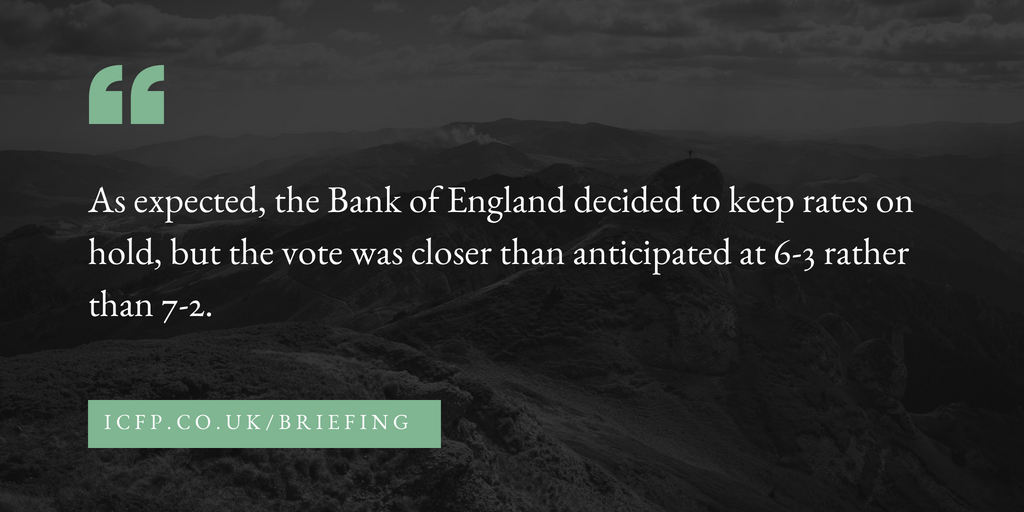In this edition of The Briefing from Informed Choice on Friday 22nd June 2018 – interest rates on hold, another Greek bailout, fraud prevention success, Brexit investment impact, and retirement default pathways.
Subscribe to The Briefing by email
Enable the Amazon Alexa Flash Briefing Skill
Interest rates on hold
The Bank of England Monetary Policy Committee has voted by a majority of 6-3 to maintain Bank Rate at 0.5%. The committee also voted unanimously to maintain the stock of corporate bond purchases and UK government bond purchases. The Committee voted unanimously to maintain the stock of sterling non-financial investment-grade corporate bond purchases, financed by the issuance of central bank reserves, at £10 billion. The Committee also voted unanimously to maintain the stock of UK government bond purchases, financed by the issuance of central bank reserves, at £435 billion.
Commenting on the interest rate announcement, Melanie Baker, Economist at Royal London Asset Management, said:
The minutes were a touch more hawkish than last month. As expected, the Bank of England decided to keep rates on hold, but the vote was closer than anticipated at 6-3 rather than 7-2. Although the majority of MPC members aren’t in an immediate hurry to raise rates, there was a sense of the door being kept firmly open for a rate rise in August.
Another Greek bailout
Eurozone finance ministers have agreed an “historic” debt relief deal with Greece. It means Athens has longer to pay back the €96.9bn of debt owned to the eurozone, extending an interest-free grace period too. The deal is being heralded as the end of the Greek debt crisis, allowing the nation to turn a new page. As part of the deal, Greece will also receive a final cash loan of €15bn from eurozone countries.
Greece has been the recipient of three bailout programmes since 2010, with the latest due to end in August. It had to enact a series of punitive economic reforms in return for the loans. Despite a more stable economic picture in Greece, it now has debt equivalent to 180% of GDP and has been facing difficulties keeping up debt repayments.
EU commissioner Pierre Moscovici said:
The Greek crisis ends here tonight. We finally got to the end of this path which was so long and difficult, it is a historic moment.
Fraud prevention success
Figures published by UK Finance have revealed that £24.7 million of fraud has been prevented and 197 arrests made thanks to the introduction of the Banking Protocol. This is a ground-breaking scheme aimed at identifying and protecting potential fraud victims when they visit a bank or building society branch. The publication of the latest figures marks one year since a national roll-out of the scheme began in May 2017.
The scheme was first introduced as a pilot in London during October 2016, before a national roll-out began in May 2017. Since March of this year it has been implemented by all 45 police forces in the UK. Since being introduced the Banking Protocol has led to 197 arrests across the country, while 3,682 emergency calls have now been placed and responded to through the scheme, with the average prevention per call equating to £6,720. The most recent figures show that the scheme prevented over £3m in fraud in May 2018 – a monthly record – while 17 arrests were made.
Katy Worobec, Managing Director of Economic Crime at UK Finance, said:
Fraud can have a devastating impact on victims and is often targeted at the most vulnerable people in society, which is why we must work together to prevent it.
The Banking Protocol shows how close cooperation between the industry and law enforcement can help to protect victims and crack down on fraudsters.
This kind of joined-up approach is crucial to stay one step ahead and ensure that unscrupulous scammers preying on customers are brought to justice.
Brexit investment impact
Brexit has had a positive or neutral impact on investments for three quarters of personal investors in the two years since the vote. That’s according to new research from The Share Centre, who surveyed more than 1,500 personal investors. This number compares to 86% of personal investors expecting a negative impact or no difference to their investments when asked the same question prior to the referendum.
56% of trades the Share Centre has executed in the two years since the referendum were ‘buys’, demonstrating that investors have so far not been put off by the immediate volatility the result of the referendum caused in 2016. Moreover, the top 10 purchased companies in the last 24 months are formed of a mix of income generative blue chips such as Lloyds Banking, Vodafone and GlaxoSmithKline as well as smaller, higher risk stocks including Sirius Minerals and UK Oil and Gas Investments.
Despite their relatively positive experience to date, personal investors’ concerns have not completely dissipated. 60% of those asked believe the lead up to leaving the European Union will have a negative impact on the stockmarket and over a third (35%) said they are already changing, or are planning to change, their investing behaviour in the lead up to the 29 March 2019.
Richard Stone, Chief Executive of The Share Centre, said:
For most personal investors rising markets since the Referendum result have driven portfolio values up and generally improved sentiment. It is certainly the case that personal investors’ fears of the impacts of a vote to Leave on the stockmarket have not materialised. However, fear has not gone away with a majority expecting a negative impact on markets as the leaving date approaches and over a third looking to alter their investment behaviour as a consequence.
Retirement default pathways
The DWP Select Committee has published the Government’s response to the Select Committee’s report on Pension Freedoms. In that report, the Committee recommended that savers should be defaulted into particular ‘pathways’ at retirement unless they made an active choice, a recommendation rejected by the government.
Commenting on the response, Steve Webb, Director of Policy at Royal London said:
The Government is right to reject the idea of a one-size fits all approach at retirement. The whole point of pension freedoms is that everyone is different and has a different pension history and different goals for the future when they reach pension age. Much more can and should be done to help people make the choice that is right for them, but defaulting them down the route that the provider thinks is best is not the answer.
Informed Choice provides a regular personal finance and investment news summary, with an updated Flash Briefing for your Alexa enabled device. Search for The Briefing from Informed Choice in your Amazon Alexa app or visit https://www.amazon.co.uk/Informed-Choice-Radio/dp/B074DZZ1MF/ to enable this Flash Briefing.


